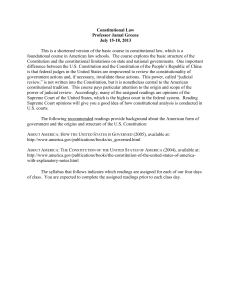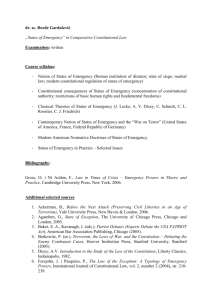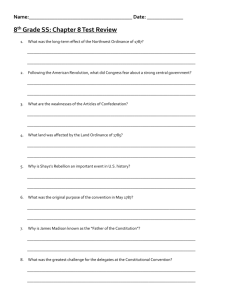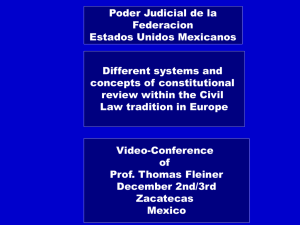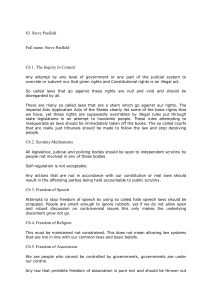Constitutional Law Conference on Implementation of the Basic Law
advertisement
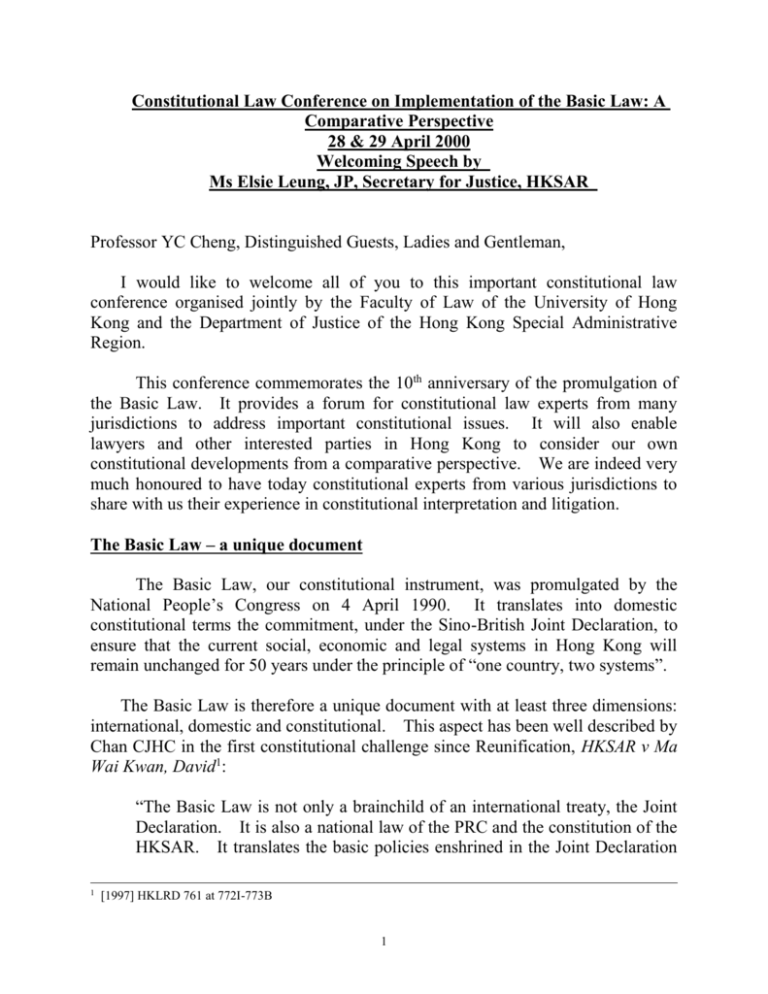
Constitutional Law Conference on Implementation of the Basic Law: A Comparative Perspective 28 & 29 April 2000 Welcoming Speech by Ms Elsie Leung, JP, Secretary for Justice, HKSAR Professor YC Cheng, Distinguished Guests, Ladies and Gentleman, I would like to welcome all of you to this important constitutional law conference organised jointly by the Faculty of Law of the University of Hong Kong and the Department of Justice of the Hong Kong Special Administrative Region. This conference commemorates the 10th anniversary of the promulgation of the Basic Law. It provides a forum for constitutional law experts from many jurisdictions to address important constitutional issues. It will also enable lawyers and other interested parties in Hong Kong to consider our own constitutional developments from a comparative perspective. We are indeed very much honoured to have today constitutional experts from various jurisdictions to share with us their experience in constitutional interpretation and litigation. The Basic Law – a unique document The Basic Law, our constitutional instrument, was promulgated by the National People’s Congress on 4 April 1990. It translates into domestic constitutional terms the commitment, under the Sino-British Joint Declaration, to ensure that the current social, economic and legal systems in Hong Kong will remain unchanged for 50 years under the principle of “one country, two systems”. The Basic Law is therefore a unique document with at least three dimensions: international, domestic and constitutional. This aspect has been well described by Chan CJHC in the first constitutional challenge since Reunification, HKSAR v Ma Wai Kwan, David1: “The Basic Law is not only a brainchild of an international treaty, the Joint Declaration. It is also a national law of the PRC and the constitution of the HKSAR. It translates the basic policies enshrined in the Joint Declaration 1 [1997] HKLRD 761 at 772I-773B 1 into more practical terms. The essence of these policies is that the current social, economic and legal systems in Hong Kong will remain unchanged for 50 years. The purpose of the Basic Law is to ensure that these basic policies are implemented and that there can be continued stability and prosperity for the HKSAR. Continuity after the change of sovereignty is therefore of vital importance. … The Basic Law is a unique document. It reflects a treaty made between two nations. It deals with the relationship between the sovereign and an autonomous region which practises a different system. It stipulates the organisations and functions of the different branches of government. It sets out the rights and obligations of the citizens. Hence, it has at least three dimensions: international, domestic and constitutional. It must also be borne in mind that it was not drafted by common law lawyers. It was drafted in the Chinese language with an official English version but the Chinese version takes precedence in case of discrepancies. That being the background and features of the Basic Law, it is obvious that there will be difficulties in the interpretation of its various provisions.” Comparative Materials in Constitutional Interpretation We are, however, not alone in facing the challenge of constitutional interpretation. I am sure that the experts speaking today will deal with this question in greater detail. But let me cite a few examples to illustrate the level of complexity that this question involves. In the United States, for example, there have been a great number of constitutional cases and learned commentaries on the interpretation of the American Constitution in the last two hundred years. Over the last two decades, moreover, constitutional debate frequently has been characterized as one between originalism or interpretivism on the one hand and non-originalism or noninterpretivism on the other hand. Originalism concerns the view that “judges deciding constitutional issues should confine themselves to enforcing norms that are stated or clearly implicit in the written Constitution.” In contrast, nonoriginalism refers to the “contrary view that courts should go beyond that set of references and enforce norms that cannot be discovered within the four corners of the document.” 2 2 Erwin Chemerinsky, Constitutional Law - Principles and Policies (1997), at p.17 2 In Canada, it is well established that the language of the Constitution Act 1867 is not to be frozen in the sense in which it would have been understood in 1867. Rather, the language is to be given a “progressive interpretation” so that it is continuously adapted to new conditions and new ideas 3 . The principle of progressive interpretation may be compared with originalism, which focuses on the original understanding of a constitutional text. In Australia, legal reasoning as the only proper approach for a court of law received great emphasis in the much celebrated decision of the High Court of Australia in the Engineers’ case (1920)4. In recent years, however, there have been indications of a change of attitude and approach – a greater awareness by some judges of the role of the court and its relation to social and political change.5 The experience in these common law jurisdictions, as well as that of the civil law tradition, will provide very useful insight into the complicated question of constitutional interpretation. SAR courts are authorised by Article 84 of the Basic Law to “refer to precedents of other common law jurisdictions” in the adjudication of cases. Purposive Approach and Home-grown Jurisprudence While comparative materials are very helpful in Basic Law interpretation, we must keep in mind the differences in constitutional arrangements between the Basic Law and other constitutional instruments. The ultimate task of an interpreter of the Basic Law is to arrive at the meaning of the Basic Law, not any other constitutional provisions. Interpretation of the Basic Law is complicated by the fact that it is a national law implemented in a common law system preserved under the Basic Law. The unique nature of the Basic Law is exemplified by Article 158 which sets out, in accordance with Article 67(4) of the PRC Constitution, that the power of interpretation of the Basic Law lies in the Standing Committee of the National People’s Congress, which has authorized the courts of the HKSAR to interpret on their own the provisions of the Basic Law that are within the limits of the autonomy of the Region in adjudicating cases. In this regard, it has been suggested, in the David Ma case, that the common 3 4 5 Hogg, Constitutional Law of Canada (updated to 1999) at 57-8 Amalgamated Society of Engineers v Adelaide Steamship Co. Ltd. (1920) 28 CLR 129 Zines, The High Court and the Constitution (1997), at p.425, 483 3 law principles of interpretation, as developed in recent years, are sufficiently wide and flexible to allow a purposive interpretation of the plain language of the Basic Law6. This purposive approach to constitutional interpretation has, in particular, been summarised by the Court of Final Appeal in the case of Ng Ka Ling7: “As is usual for constitutional instruments, [the Basic Law] uses ample and general language. It is a living instrument intended to meet changing needs and circumstances. It is generally accepted that in the interpretation of a constitution such as the Basic Law a purposive approach is to be applied. The adoption of a purposive approach is necessary because a constitution states general principles and expresses purposes without condescending to particularity and definition of terms. Gaps and ambiguities are bound to arise and, in resolving them, the courts are bound to give effect to the principles and purposes declared in, and to be ascertained from, the constitution and relevant extrinsic materials. So, in ascertaining the true meaning of the instrument, the courts must consider the purpose of the instrument and its relevant provisions as well as the language of its text in the light of the context, context being of particular importance in the interpretation of a constitutional instrument8.” Applying a purposive approach in developing our home-grown constitutional jurisprudence, the Court of Final Appeal has, in the recent flag desecration case, taken into full account comparative materials in the interpretation of the Basic Law. In that case, in holding that the restriction on freedom of expression imposed under the National and Regional Flag Ordinances is legitimate to protect societal and community interests, the Court of Final Appeal made reference to a number of democratic nations which have ratified the International Covenant on Civil and Political Rights, and which have enacted legislation that protects the national flag by criminalising desecration9. The Court also referred to the two American flag desecration cases,10 and decisions and practices in overseas countries 11 . The SAR Government, for the first time, tendered evidence by way of a Brandeis Brief, which has been commonly deployed in constitutional cases in the United States and Canada. 6 HKSAR v Ma Wai Kwan, David, ibid. at 803D per Mortimer V-P Ng Ka Ling v Director of Immigration [1999] 1 HKLRD 315 8 Ng Ka Ling v Director of Immigration, ibid. at 339I-340B per Li CJ 9 HKSAR v Ng Kung Siu [1999] 3 HKLRD 907, at 926F per Li CJ 10 Texas v Johnson 491 US 397 (1989); United States v Eichman 496 US 310 (1990) 11 Italy, Germany, Norway, Japan & Portugal, HKSAR v Ng Kung Siu, ibid. at 931D-932A per Bokhary PJ 7 4 These all point to the fact that the constitution is a living instrument, capable of meeting changing needs and circumstances. This was elegantly captured by Lord Sankey’s metaphor of “a living tree capable of growth and expansion within its natural limits”12. We are at the beginning of the journey to develop our own constitutional jurisprudence. The experience from overseas jurisdictions will be very valuable to us, and will provide a fruitful source of inspiration for such development. We are fully aware, however, that we are faced with unique constitutional issues that may not have been encountered elsewhere. With a positive approach, and knowledge gained from other jurisdictions, there is no doubt that such issues can be resolved in a satisfactory manner under the principle of “one country, two systems”. I am confident that the sharing of experience in constitutional interpretation and litigation from a comparative perspective in this conference will be a helpful step towards this end. I would like to thank the speakers and moderators, and all of you who are participating in this conference. I would also like to express my gratitude for the hard work of the Faculty of Law of the University of Hong Kong in co-organising this conference. I hope you will all enjoy it. Thank you. #17520 v3 12 Edwards v A.-G. Can. [1930] AC 124, at 136, see Hogg, Constitutional Law of Canada (updated to 1999) at 33- 17 5


